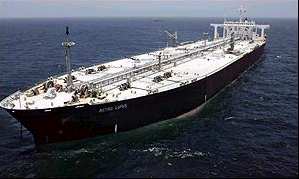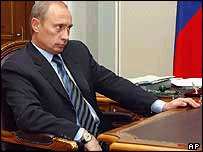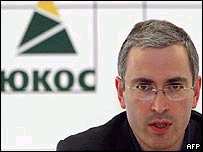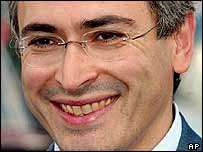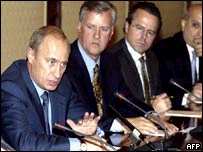|
|
|||||||||||||||||||||||||||||||
|
Russian Oil & the WEIGHT of Oil in International Economics
By Suzanne MacNevin Russian President Vladimir Putin has arrested Michail Khodorkovsky (CEO of Russian oil oligarch Yukos) on charges of fraud and corruption. Putin is following suit of America's crackdown on companies such as Enron and people like Martha Stewart. However, Chevron-Texaco wants to buy the Russian oil company for billions of dollars (US), and they sicked George W. Bush on the issue for them. Bush is undoubtably the lapdog of the oil companies for sticking his nose into the Russian oil business... Why would Bush even bother to stick his nose into the business of a Russian company in the first place? Well for starters, his presidency has been more about oil than any previous president. At the start of his presidency, he cut foreign funding to all Arab countries for humanitarian needs (food, hospitals, immunization of diseases like smallpox and measles). The World Trade Centre was also home to many oil companies, including UNOCAL Oil (United Oil Companies of California) which Bush owns stocks in. UNOCAL tried to build an oil pipeline across Afghanistan in the summer of 2001, but were turned down by the Taliban government. As soon as Bush took over Afghanistan however, UNOCAL was already setting up offices and hiring workers to build the oil pipeline. Afghanistan in general is an important part of the world oil market. Not because it has oil, but because it is valuable for transporting oil. Being able to control the only pipeline through Afghanistan will make UNOCAL Oil very rich. Iraq has 90% of the world's untapped oil reserves. There are literally tens of thousands of oil wells in Iraq that haven't even tapped yet. Iraq was once one of the richest oil countries in the world, before the Gulf War happened and the US imposed international sanctions. The Gulf War first started when Iraq attacked Kuwait. Why? Because Kuwait had stolen millions of barrels of Iraqi oil and was selling it on the black market to the United States for a low rate. Thus both Bush governments have been knee deep in the stuff. Thus we shouldn't be surprised when the current Bush government sticks its nose where it doesn't belong. George W. Bush should be more worried about the pyroterrorists who are burning down California than about a Russian oil company that is cheating on its income taxes. To get a BETTER idea of the history of this interesting affair of politics and oil, please read the articles below collected from the BBC World News, the Toronto Star, the New York Times and even the Chevron-Texaco website.
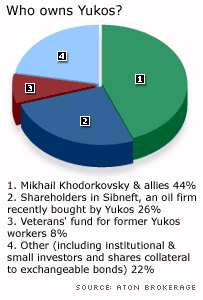
Article from BBC World News:Oil trade strengthens US-Russian ties Monday, 8 July, 2002, 22:16 GMT 23:16 UK The first ever direct shipment of Russian oil to the US has reached the port of Houston. The delivery of 2 million barrels of crude oil, which arrived on the super tanker Astro Lupus, was organised by Yukos, Russia's second largest oil company. In the 1970s, Moscow used Venezuela as an intermediary for reaching North America's oil market. The current deal is the first ever direct sale, and Russian and US officials hope it will not be the last. Yukos' chief executive, Mikhail Khodorkovsky, said the shipment was "merely experimental" and that its profitability had yet to be estimated. The firm sees the shipment as part of the Russia-US "energy dialogue" launched in May when US President George Bush visited Moscow. Mr Bush and Russian President Vladimir Putin promised to work together to "reduce volatility and enhance predictability" in world oil markets. Both countries are seen as wanting more Russian oil to enter the US, which has been reliant for imports mostly on countries in the Opec producers' cartel. But Russia, which is not an Opec member, is believed to have mapped a future in denting the cartel's market share. The US, meanwhile, is seen as keen on decreasing its dependence on the Middle East for oil. Mr Khodorkovsky told BBC News Online that Yukos and its rivals would be able to fill the gap in the market if Opec cut its production. A recovery in production in the past three years has elevated Russia to third place in the world oil production league, with exports narrowly behind those of Saudi Arabia. And production is likely to rise further, by 7-8% this year, after Russia this month ends an output restriction imposed as part of a global effort to boost the crude price. Yukos itself expects a 20% increase in production this year to 1.4 million barrels per day. The company, praised by investors for its unusual - by Russian standards - transparency and corporate governance practices, is looking for new markets. Projects outside Russia range from oil refineries in Germany to a pipeline in China. Yet, while linked to Europe by pipelines, the continent is not seen by Yukos as its main target for expansion. The EU is cautious in letting Russia increase exports to Europe, Mr Khodorkovsky says. Even exporting to the US is not quite as straightforward as it might seem. According to some estimates, the cost of transportation may be as high as $1.50 per barrel, leaving producers with a profit of $1-$1.50 per barrel at best. Russia has no deep-water ports, so the oil was transported from Black Sea terminals in small tankers to an Aegean Port where it was loaded onto the Astro Lupus. It not surprising that Yukos has failed to promise more US shipments in the near future. The firm's rivals have dismissed the venture as a "public relations action". Not that shipment represents Russia's only challenge. The country's currently explored oil fields are expected to run dry in 20-25 years, and Russia's oil industry does not have enough money to explore new ones. And amid all the talk of opening up the country, Russian officials are seen as trying to keep foreign investors away from the most profitable oil projects. The level of direct foreign investment in Russia's oil industry is a mere $4.5bn. Most of that goes to high-risk and costly offshore projects in the Pacific, and the construction of a pipeline connecting Caspian oil fields to Black Sea ports. The Russia-US "energy dialogue", of which the Yukos' shipment to Huston was the first visible sign, might yet see the country's oil industry open up for future investors.
From Chevron website:Analysts Cast Doubt on Chevron-Yukos Deal, August 4, 2003 MOSCOW (Dow Jones)--Analysts Monday poured cold water on the prospect that Chevron-Texaco Inc. (CVX) will take a minority stake in Russia's largest oil company Yukos (R.YUK), saying that such a deal would be fraught with difficulties. The analysts' comments came after London's Sunday Times reported that Chevron had approached Yukos with a proposal to buy a 25% stake. The newspaper said Chevron's offer had been triggered by the possibility that Yukos' plan to take over its smaller rival, OAO Sibirskaya Neftyanaya Kompaniya (R.SBN), or Sibneft, was "looking shaky." A recent spate of actions by law enforcement agencies against Yukos shareholders and executives has prompted speculation that the merger with Sibneftmay not happen. Yukos and Chevron-Texaco officials declined to comment. For Chevron, a stake in Yukos would address two of its most pressing strategic problems - falling output and difficulties in replenishing reserves. Yukos' output is still growing at nearly 20% this year, while last year it added three times as many barrels of reserves as it produced. The Sunday Times said that Chevron may pay just over $6 billion for a 25% stake, a valuation that would exclude Sibneft, according to Aton Capital Chief Strategist Steven Dashevsky. If the Sibneft merger does go through, he added, Chevron would face dilution to 18% and lose any blocking minority rights almost immediately, if the merger does happen. Erik Wigertz, co-head of research at United Financial Group in Moscow, noted that even a 25% stake would be less than ideal for Chevron. "Not many oil companies would be happy with 25%," he said. "A stake of 25% gives you some protection, but no control." Officials at Yukos and Sibneft insist the Sibneft deal is still on track. There is also a $1 billion breakup fee involved in the merger agreement that will act as a strong deterrent to any second thoughts on their part. Investment bankers active in Russia's oil sector say international oil majors routinely talk to most large Russian oil companies in part as a way of maintaining good relations. These bankers point out, however, that the western companies are generally more keen than the Russians to strike deals. That indicates that the leak to the Sunday Times may be an attempt by Chevron and its advisers to put pressure on Yukos to rethink its commitment to Sibneft. Leaks to U.K. Sunday newspapers are also a common way for companies to test the market's support for new or revived merger ideas. However, UFG's Wigertz said there's "no reason" to think Yukos will pull out of the Sibneft takeover, pointing to a string of announcements in recent weeks relating to the deal. Yukos has already announced the terms of a closed subscription share issue through which it will acquire the controlling interest in Sibneft, as well as the terms of a related public share buyback, which begins Wednesday. However, there are still some obstacles to the Sibneft deal. The Ministry for Antimonopolistic Practices has still not given its blessing and is unlikely to do so before mid-August, officials say. Equally, question marks still hang over the final element of the Yukos-Sibneft deal, a bond to be issued by Yukos to give the combined company a net debt of up to $5 billion. The newspaper Vedomosti reported Monday that the company was preparing to take a syndicated loan of "no less than $1 billion" from international banks instead of issuing the bond. Yields for all Russian international debt have increased following Yukos' spat with the prosecutors, which has raised wholesale perceptions of Russian country risk, but which has made a debut issue for Yukos particularly difficult. Analysts say a bond issue in the current climate would be far more expensive than when the plan was originally announced in April. Yukos' Chief Financial Officer Bruce Misamore has said that Yukos doesn't "need to complete a bond financing as such in order for the merger...to be completed." However, he stressed Monday that the company is still keeping its options open. He agreed that a syndicated loan was one option Yukos was considering as it aimed to align its capital structure with that of Sibneft before the merger's completion. Two weeks ago, Sibneft's board approved an extraordinary dividend payout of $1 billion for the first half of 2003, a move that also helped the two companies closer to their net debt target and reduced the amount that Yukos will need to borrow in its own name. Around 1115 GMT Monday Yukos shares were changing hands at $11.82 in Moscow, up 2.3%.
Article from Toronto StarPresident Vladimir Putin invited leading Russian and foreign investors to the Kremlin today in an apparent attempt to calm financial and political jitters following the arrest of Russia's richest tycoon and the reported resignation of the Kremlin chief of staff. But before the meeting convened, prosecutors froze a 53 per cent share of the stocks in Yukos, the Russian oil giant headed by Mikhail Khodorkovsky, Interfax news agency reported. News of the freezing sparked a quick five per cent plunge in the company's share price in Moscow trading, Interfax said. Yukos shares have fallen more than 30 per cent from their all-time high of $16 US posted Oct. 17. Khodorkovsky was arrested and jailed Saturday on charges of tax evasion, fraud and forgery. The arrest, which followed a four-month probe into Yukos, has been portrayed by Putin critics as an action staged by some of the president's top lieutenants to avenge the tycoon's political activities, which included funding opposition parties. Putin's chief of staff, Alexander Voloshin, a top Kremlin advocate of big business, reportedly resigned to protest Khodorkovsky's arrest. The resignation would signal a strengthening of the security service faction in the Kremlin ?connected with Putin from his days as a KGB agent ?which appears eager to stem the influence of magnates such as Khodorkovsky. Top Russian news organizations reported that Voloshin submitted his resignation to Putin on Saturday after Khodorkovsky's arrest, but agreed to wait a few more days to avoid inflicting political damage on the president. The Kremlin has refused to comment on the reports. Interfax reported Thursday that Anatoly Chubais, head of energy monopoly Unified Energy Systems, invited Voloshin, who serves as the company's board chairman, to become a full-time employee of the company. UES wouldn't comment on the report. Khodorkovsky's jailing has sent Russian stocks down amid investor fears that the Kremlin could launch a broad revision of the results of the privatization of the 1990s. Tycoons like Khodorkovsky snapped up prized chunks of state assets at giveaway prices in dubious auctions. Putin said Monday that the prosecutors' probe against Yukos won't herald the redistribution of privatized assets. But the seizure of Yukos shares on Thursday sent a different signal. "This unlawful approach to the seizure of assets of persons allegedly guilty of some trumped-up charges of inflicting damage will soon allow apartment blocks and individual apartments to be seized," Interfax quoted Yukos spokesman Alexander Shadrin as saying. Shadrin did not further explain his allegation. The transfer of state-owned apartments to their residents was the only part of the post-Soviet privatization program widely accepted by the Russian public. Article from the New York Times:How exactly did an American find himself running not only Russia's largest oil producer, but one at the center of the country's latest political crisis? Only two months ago, Steven M. Theede, a 51-year-old Midwesterner, worked for a competitor, ConocoPhillips, where he had been for 30 years. And Mr. Theede and his new boss, Mikhail B. Khodorkovsky, had crossed paths ?some would say swords ?in recent years. Both were working for large oil companies looking to expand their business in Russia's oil industry, which was recovering from a decade of falling production since the Soviet Union's collapse. "I wouldn't say we ever knew each other personally, but we met each other briefly since the year 2000, in terms of engaging in business dealings," Mr. Theede said in an interview. The first time they "had a serious conversation," he added, was earlier this year, when they met in London to discuss Mr. Theede's moving to Yukos, which was hunting for a chief operating officer. Mr. Theede took the job. Then, with the arrest of Mr. Khodorkovsky on Saturday, he was promoted to chief executive of Russia's biggest company and the world's fourth-largest producer of crude oil. Mr. Theede (pronounced THEE-dee) was born in Hutchison, Kan. In 1974, he graduated from Kansas State University with a degree in mechanical engineering and joined Conoco, working in production, refining and marketing. Mr. Theede's most recent post at the company, which had merged to become ConocoPhillips, was president of exploration and production for Europe, Russia and the Caspian. He and Mr. Khodorkovsky were fierce adversaries on at least one signficant topic: proposed production-sharing agreements, which would have allowed foreign companies to take part in energy ventures that share the work and the profits. Mr. Theede supported them, while Mr. Khodorkovsky opposed production sharing, saying foreign oil companies should instead buy their Russian counterparts. Mr. Theede speaks "some Russian," he said, but he seems to speak flawless Russian business. For the Thursday evening news, the Russian press and television cameras massed outside Yukos's main Moscow offices in the darkening autumn night. Dressed in the buttoned-up suit and tie that is the uniform of headquarters, Mr. Theede reacted calmly to news that Russian prosecutors had sequestered nearly half the company's shares, pointing out that control remained with shareholders; Mr. Khodorkovsky is the majority owner. As to the plummeting price of Yukos's stock, he commented in language familiar to Western shareholders, and far less blunt than a typical Russian executive's. "We always prefer to have our share price higher rather than lower," he said. "The reaction today was the result of the government putting what I'd call a restriction on the shares. We're still, even right now, assessing what's happened."
Article from the Toronto Star:Russia's prime minister ignored his boss' warning not to meddle in a prosecution campaign against oil giant Yukos, saying yesterday he's "very troubled" by a Kremlin move to freeze the company's stocks. The comments from Russia's No. 2 leader appear to be the boldest sign yet of defiance within President Vladimir Putin's cabinet concerning an escalating investigation that has stoked financial and political turmoil. "The arrest of shares of a private company that is traded on the market is a new phenomenon, the consequences of which are hard to define since it's a new form of influence," Prime Minister Mikhail Kasyanov said in the southern city of Nalchik, in remarks shown on Russian television. Putin bluntly warned his cabinet Monday against interfering in a state investigation into Russia's largest oil company and its head Mikhail Khodorkovsky, arrested last Saturday by special agents at a Siberian airport. Khodorkovsky, among other things, is charged with fraud. He blames the investigation on infighting in Putin's administration. The split became open Thursday when the Kremlin announced Alexander Voloshin's departure as chief of staff. Voloshin, like Kasyanov, was linked with former President Boris Yeltsin's circle, which carried out the vast privatization of Soviet state assets in the mid-1990s that allowed tycoons to profit from the selloff. Putin named Dmitry Medvedev, first deputy chief of staff and chairman of natural gas giant Gazprom, his chief of staff. Article from BBC World News:Russia has dismissed Western criticism of its investigation into alleged tax fraud at the country's oil giant Yukos. The US and Germany had sought assurances that the arrest of Yukos boss Mikhail Khodorkovsky was not politically motivated. But the Russian foreign ministry said the US criticism was "at the very least, tactless and disrespectful". Mr Khodorkovsky, believed to be Russia's richest man, has financed liberal opposition groups in Russia. Correspondents say it is widely assumed that is why President Vladimir Putin's government has taken legal action against him. 'Double standards' The US State Department spokesman, Richard Boucher, had asked Moscow to dispel concerns that the case against Mr Khodorkovsky was of a political nature. And a spokesman for German Chancellor Gerhard Schroeder said legal certainty was essential if Russia was to continue its integration into the world economy. Germany is Russia's largest trading partner and an important source of much-needed foreign investment. Referring to the US statement, Russian foreign ministry spokesman Alexander Yakovenko said it was "a continuation of a notorious policy of double standards". "I cannot remember the State Department making such statements about other countries in similar cases," the spokesman told Russian television. Mr Yakovenko accused the US of violating human rights in Iraq and at Guantanamo Bay in Cuba, where hundreds of Taleban and al-Qaeda suspects have been held without trial for more than a year. Last Thursday, Russian prosecutors froze almost half the shares in Yukos, though the freeze on some of those shares was lifted the following day. Russia's stock market has lost almost 15% of its value over the past week. Analysts say Mr Khodorkovsky's funding of opposition groups broke a tacit agreement to stay out of politics in return for avoiding investigation of his financial affairs. Putin remains strong The head of the Russian parliament's budget committee, Alexander Zhukov, told the BBC on Saturday that, while he was bothered by the Yukos affair, it was unlikely to lead to any wider investigation of Russian businesses. "The president has already answered that... most likely this will be the only case," he told BBC Radio 4's Today programme. "It's not going to open up the door to everything." But on Friday, Prime Minister Mikhail Kasyanov broke ranks with the Kremlin by saying he was "deeply concerned" by events. His comments come amid speculation that the prime minister's position may ultimately be under threat. Mr Putin's chief of staff Alexander Voloshin, a fellow Yeltsin-era appointee, was replaced on Thursday amid reports that he was angry at the judicial campaign against Yukos. The BBC's Ian MacWilliam says Mr Putin has sought to play down fears that the case heralds a wider campaign against the so-called oligarchs - the small group of super-rich businessmen who grabbed control of the country's most profitable industries during the privatisation of the 1990s. But some analysts say the events surrounding Yukos have created the biggest political and economic crisis of Mr Putin's three years in office. However, the Russian president appears to enjoy widespread public support - at about 73% - according to the latest poll conducted by the VTSIOM opinion research centre across 100 Russian cities and towns.
|
|
||||||||||||||||||||||||||||||
|
Website Design + SEO by designSEO.ca ~ Owned + Edited by Suzanne MacNevin | |||||||||||||||||||||||||||||||
